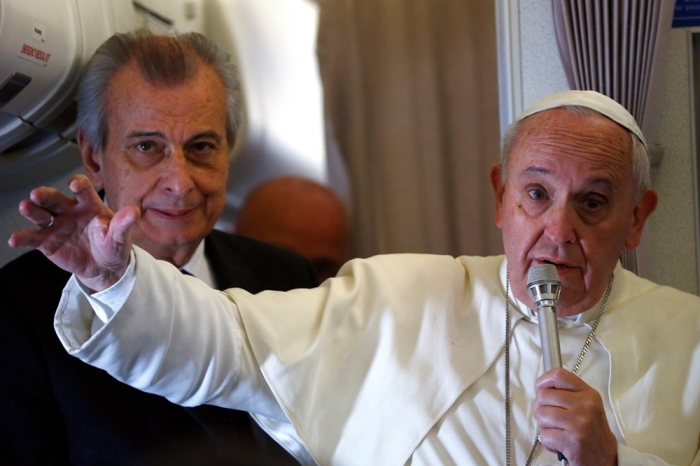Pope Francis: People Who Report Fake News Are Like Those Who Eat Poop

Pope Francis, the head of the Roman Catholic Church. recently compared those who smear politicians or engage in deceptive news reporting with people who like eating fecal matter.
In an interview with the Belgian Catholic weekly published on Wednesday, the pontiff was asked for his opinion about current news media.
"The communications media have a very great responsibility. Nowadays they have in their hands the possibility and the capacity to form opinion: they can form a good or a bad opinion," explained Francis.
"It is obvious that, given that we are all sinners, also the media can ... become harmful. And the communications media have their temptations. They can be tempted by calumny, and therefore used to slander, to sully people, especially in the world of politics."
The pontiff went on to explain that smearing politicians for past personal wrongs or inaccurate information such as fake news is comparable to "coprophagia," a word meaning the consumption of feces.
"Disinformation is probably the greatest damage that the media can do, as opinion is guided in one direction, neglecting the other part of the truth. And then, I believe that the media should be very clear, very transparent," continued Francis.
"[The media should not fall] to the sickness of coprophilia, which is always wanting to communicate scandal, to communicate ugly things, even though they may be true. And since people have a tendency towards the sickness of coprophagia, it can do great harm."
The pope's remarks come at a time when in the United States there is an increased concern over the negative impact of fake news.
"Fake news has been blamed for everything from the election of Donald Trump to the recent (and frightening) situation in Washington, D.C., when a man entered a neighborhood pizza parlor with a gun to 'self-investigate' a fake news report about a child sex ring allegedly operating out the establishment," reported The Blaze.
"And if reports are to be believed, much of the fake news that circulates is generally shared on social media sites such as Facebook. Facebook and other tech giants like Google have suggested that they might begin blocking known fake news sites."
Others have been more critical of the concerns about fake news, arguing that the real menace to society is a biased mainstream media.
"However, most junk journalism does not take the form of outright 'fake news' but of tendentious reporting that focuses on some facts while downplaying or omitting others. And here, the mainstream media are indeed often guilty of bias," reasoned one column published by The Hill last month.
"In the days before the internet could pose a real challenge to the mainstream media's dominance, it led to the uncritical acceptance of highly dubious claims and statistics, such as 3 million homeless Americans during Ronald Reagan's presidency."





























